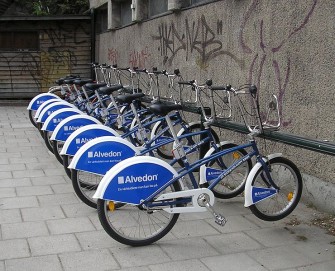
'Show Me the Money' - The Cyclist, the Politician and the Tax Incentive.
Should cyclists be remunerated? If so, how much cash should they receive? Fresh back from a visit to the Swedish Parliament, ECF Staff member Martti Tulenheimo reports on tax incentives, and how cycling has become increasingly popular in Swedish centre-right circles.
I was once talking to a Dutchman about transport policy, and he lamented how “Everybody thinks that the Dutch are left-wing. It’s not true. They can be really conservative. They’re just pragmatic.”
Last week saw me talking to a variety of Swedes about bicycles for transport, from Members of Swedish Parliament to Stockholm’s City Council and regional transport authorities. It would appear that a seismic shift has taken place in Sweden. Bicycles, often heralded as idealistic fodder of the centre-left, are now appealing to all political parties, classical liberals included.
Our meeting with Swedish MPs was hosted by Anders Åkesson, from the Centre Party, which sits on the centre-right spectrum of Scandinavian politics. They are really interested in getting more people on bicycles. (Swedish modal share currently sits just under 10% with Stockholm having a disproportionately low but a growing number of people cycling).
A Swedish Member of the European Parliament, Kent Johansson (also from the centre sitting party, the Alliance of Liberals and Democrats), has been commissioned by the Swedish government to write a report on some of the legislative measures Sweden can take to improve conditions for cycling. This report is due in autumn 2012.
It’s pretty obvious to see why classical liberals should love cycling: it is good for both the individual (in terms of improving personal mobility) and it makes sense in pure economic terms:
- A Dutch study says that every 1% increase in the number of employees that cycle to work saves their employers €27M per year in reduced sick days.
- Let’s not forget that cyclists are more productive at work and they don’t require expensive parking spaces.
- Gridlocked roads are also becoming mightily expensive: Transport 2012.org puts a 200 billion Euro price tag on congestion in Europe (approximately 2% of GDP).
These are but a few of the reasons why the centre-right is now getting behind bicycles for transport. You could go even further and talk about public health systems, reduced infrastructure costs, better air quality etc. (which we of course discussed in detail during our visit), but the list frankly would be too long. Cycling, is every fiscally conservative politician's best friend!
Reaching out to Members
ECF Secretary General Bernhard Ensink and Policy Officer Martti Tulenheimo were visiting Stockholm for a parliamentary committee breakfast meeting. As part of the trip, ECF assisted its Swedish member, Cykelfrämjandet, by meeting with key actors in the transport and political field. For more information contact Martti Tulenheimo.
Tax incentives for Cyclists.
A particular aspect which the Swedish MPs found enticing was tax incentives. Alone, these will not lead to Dutch and Danish levels but they can be extremely useful when coupled with hard measures (e.g. improved infrastructure, minor changes in legislation allowing cyclists to better use existing infrastructure etc.).
A reason why politicians may be particularly fond of tax incentives is because as a commitment they feel more direct. For example, giving money to transport authorities may not have the same direct immediate change nor can politicians always prescribe how this money is spent.
As for tax schemes, there are already some in place. Belgian commuters are being paid 21 euro cents per kilometre, where as those in the Netherlands can earn 15 cents and participants in Britain* up to 20 pence per mile – all of it tax-free for the employee. France’s new national bicycle plan is mandated to investigate potential remuneration for those commuting by bicycle.
Altogether this new interest in cycling is very promising development, especially considering it’s coming from a centre-right party. Times are a changing indeed.

About the Author
Martti Tulenheimo is the ECF Policy Officer for Urban Mobility and Member Contact Person.
- For more information on tax incentives for cyclists in Europe, see:
Tax incentives encouraging employees to cycle to work.
*This figure refers only to business miles, not commuting.
Contact the author
Recent news!
Upcoming events
Contact Us
Avenue des Arts, 7-8
Postal address: Rue de la Charité, 22
1210 Brussels, Belgium











